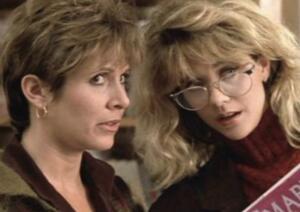The Five Most Feminist Moments from When Harry Met Sally
These days, it feels like most television shows and movies are not aging well in this new era where people of color, women, and the LGBTQ community are all considered people who deserve basic dignity (Oh, Scrubs, bless your toxic masculinity heart). So, it was with some trepidation that I decided to revisit the rom-com that was foundational to my first understandings of the lovability of opinionated women: When Harry Met Sally.
Imagine my delight when I discovered that, much like a fine wine and the old bag of M&Ms I recently found in the console of my car, Nora Ephron’s classic and smart script has not only aged well but has in fact been improved by a growing social awareness that women shouldn’t be shamed for knowing what they want and how they want it. Shoutout to the mainstreaming of feminism!
While the film isn’t perfect, here are the five things from When Harry Met Sally that have aged particularly well as the film turns 29 (seven more years before it starts freaking out that it hasn’t had children!).
- Meg Ryan’s 22-Year-Old Sally Albright. In the first few moments of the movie, it becomes clear that Sally is not having any of Billy Crystal’s, aka Harry Burns’ woe-is-me masculinity. When he brags about sitting and contemplating death for hours at a time, Sally’s chipper: “That doesn’t make you deep or anything” is the response that we all need to start using when men start waxing poetic about their existential angst.
- That Scene. We all know that scene, that “I’ll have what she’s having” iconic scene. Since When Harry Met Sally premiered (on July 12, 1989) discussions about the orgasm gap and female sexuality have grown less taboo. I feel pretty confident that this scene was the first time a woman has ever openly faked an orgasm on the big screen. Kudos to Nora Ephron and Meg Ryan for so exuberantly breaking the mainstream silence about women faking orgasms! Dr. Ruth, Jaclyn Friedman (and all of us) are eternally grateful.
- Being High Maintenance. I am definitely not super chill all the time and, I am not going to lie, when Harry Burns started to talk about the difference between high-maintenance and low-maintenance women, my heart sank a little at the idea that this incredibly high-maintenance man could unironically call anyone high-maintenance. Sally’s response, however, warmed my feminist heart: “I just want it the way I want it.” YAS. There is nothing wrong with knowing what you want and asking for it. Go, Sally!
- The Old Love. The little interviews with all of the older couples will always be golden. The next time someone asks how I knew my person was my person, I am totally just going to say, “I just knew. I knew the way you know about a good melon.”
- The Best Best Friend: Carrie Fisher. Whether it comes to dating, books, or recurring life crises, she is there with a quip, some perspective, and a rolodex of men. Repeat after Carrie: He. Is. Never. Going. To. Leave. Her.
As an added feminist bonus, check out Nora Ephron’s timeless commencement address at her alma mater, Wellesley College, in 1996. She encourages the graduates: “Whatever you choose, however many roads you travel, I hope that you choose not to be a lady. I hope you will find some way to break the rules and make a little trouble out there. And I also hope that you will choose to make some of that trouble on behalf of women."








The issue I take with #5 is that Carrie Fisher’s “Marie” doesn’t ever say that line to one of her friends; she says that line to herself because she is the “other woman” and is coming to terms with the fact that those men won’t be ever leave their person. She’s knowingly getting with men knowing they’re in other relationships. Not a feminist move if women are supposed to be supportive of other women. The self-realization that they won’t ever leave their spouses/girlfriends is something she comes to on her own as she talks out her dilemma with her girlfriends (who all know already that he will never leave “her”). Her self-enlightenment is more feminist than the quote itself. Maybe that’s what you were implying.
Re : Harry met sally
Men thinking about death and suicide shouldn't be taken glibly or lightly or simply brushed off vwith caustic retorts. Just as women who are depressed should be treated with a certain measure of tolerance and kindness and understanding.
As for the photo of the woman, women who hate their fathers or men in general because they've been abused and mistreated should perhaps be and look like the women they want to be and not resemble the men they can't deal with, can't stomach and loathe.
Cordially,
George Ferenci